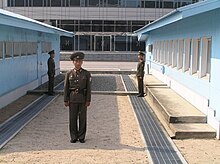
Back Grens Afrikaans Grenze ALS Muga AN حدود سياسية Arabic Llende AST Sərhəd Azerbaijani مرز AZB Robežios BAT-SMG Граница Bulgarian সীমানা Bengali/Bangla
Borders are usually defined as geographical boundaries, imposed either by features such as oceans and terrain, or by political entities such as governments, sovereign states, federated states, and other subnational entities. Political borders can be established through warfare, colonization, or mutual agreements between the political entities that reside in those areas.[1]
Some borders—such as most states' internal administrative borders, or inter-state borders within the Schengen Area—are open and completely unguarded.[2] Most external political borders are partially or fully controlled, and may be crossed legally only at designated border checkpoints; adjacent border zones may also be controlled.


Buffer zones may be set up on borders between belligerent entities to lower the risk of escalation. While border refers to the boundary itself, the area around the border is called the frontier.
- ^ Slater, Terry (2016). "The Rise and Spread of Capitalism". In Daniels, Peter; Bradshaw, Michael; Shaw, Denis; Sidaway, James; Hall, Tim (eds.). An Introduction To Human Geography (5th ed.). Pearson. p. 47. ISBN 978-1-292-12939-6.
- ^ Fehlen, Fernand [in Luxembourgish] (2017). "Mental Barriers Replacing Nation-State Borders". In Andrén, Mats; Lindkvist, Thomas; Söhrman, Ingmar [in Swedish]; Vajta, Katharina (eds.). Cultural Borders of Europe: Narratives, Concepts and Practices in the Present and the Past. Berghahn Books. p. 122. ISBN 978-1-78533-591-4.
© MMXXIII Rich X Search. We shall prevail. All rights reserved. Rich X Search